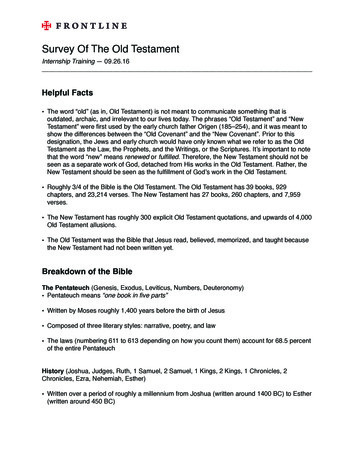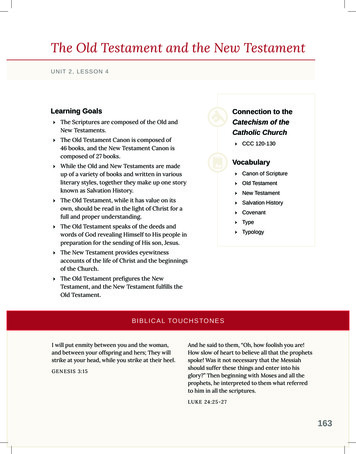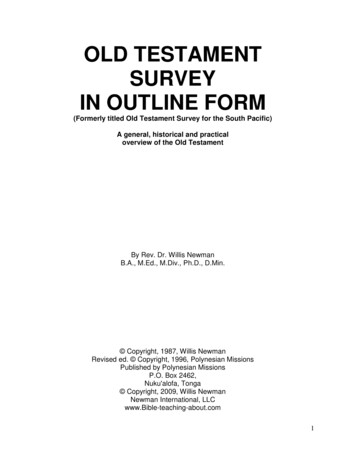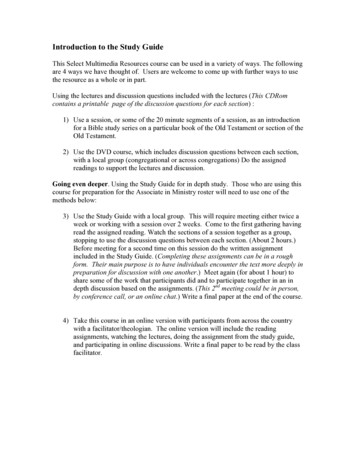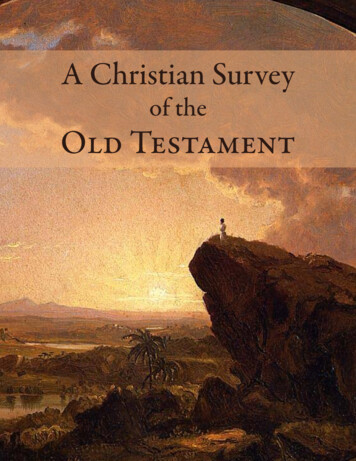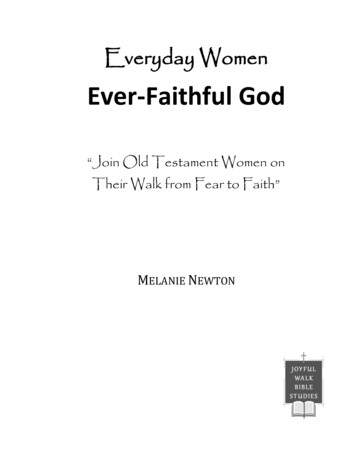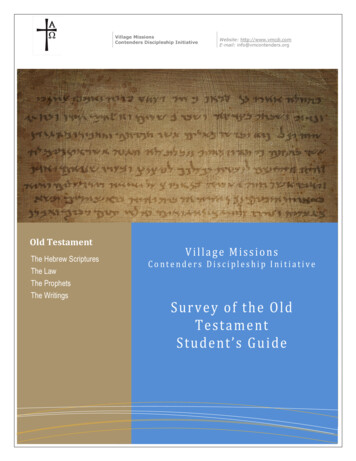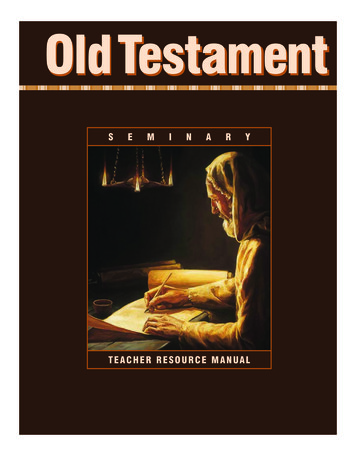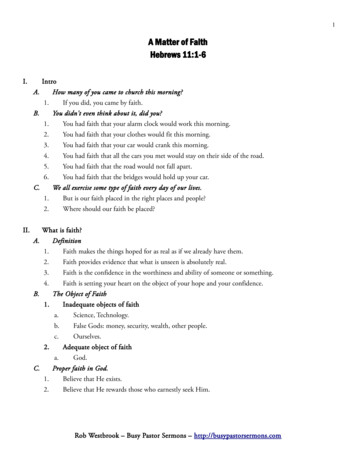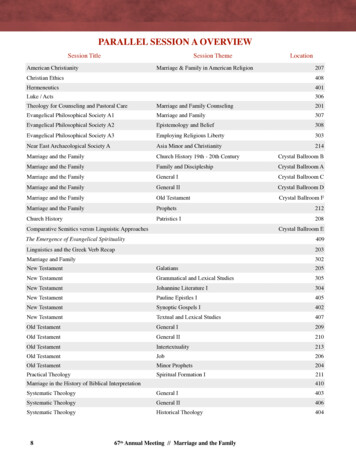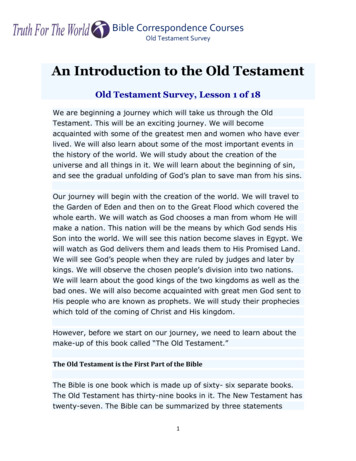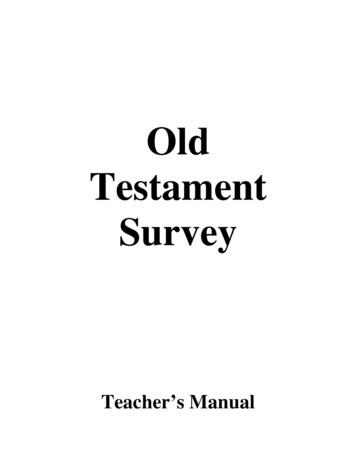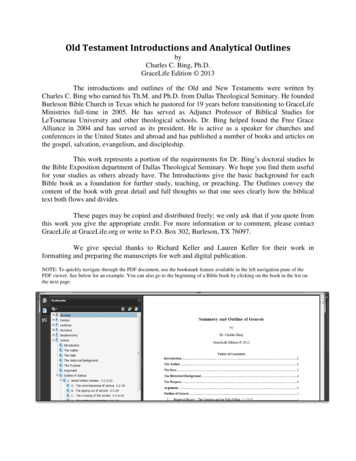
Transcription
Old Testament Introductions and Analytical OutlinesbyCharles C. Bing, Ph.D.GraceLife Edition 2013The introductions and outlines of the Old and New Testaments were written byCharles C. Bing who earned his Th.M. and Ph.D. from Dallas Theological Seminary. He foundedBurleson Bible Church in Texas which he pastored for 19 years before transitioning to GraceLifeMinistries full-time in 2005. He has served as Adjunct Professor of Biblical Studies forLeTourneau University and other theological schools. Dr. Bing helped found the Free GraceAlliance in 2004 and has served as its president. He is active as a speaker for churches andconferences in the United States and abroad and has published a number of books and articles onthe gospel, salvation, evangelism, and discipleship.This work represents a portion of the requirements for Dr. Bing’s doctoral studies Inthe Bible Exposition department of Dallas Theological Seminary. We hope you find them usefulfor your studies as others already have. The Introductions give the basic background for eachBible book as a foundation for further study, teaching, or preaching. The Outlines convey thecontent of the book with great detail and full thoughts so that one sees clearly how the biblicaltext both flows and divides.These pages may be copied and distributed freely; we only ask that if you quote fromthis work you give the appropriate credit. For more information or to comment, please contactGraceLife at GraceLife.org or write to P.O. Box 302, Burleson, TX 76097.We give special thanks to Richard Keller and Lauren Keller for their work informatting and preparing the manuscripts for web and digital publication.NOTE: To quickly navigate through the PDF document, use the bookmark feature available in the left navigation pane of thePDF viewer. See below for an example. You can also go to the beginning of a Bible book by clicking on the book in the list onthe next page.
Hyperlink BookmarksGenesisSong of Joel1 & 2 SamuelAmos1 & 2 KingsObadiah1 & 2 stesMalachi
Summary and Outline of GenesisbyDr. Charles BingGraceLife Edition 2013Table of ContentsIntroduction . 2The Author . 2The Date . 2The Historical Background . 2The Purpose . 3Argument . 3Outline of Genesis . 7Primeval History: The Creation and the Fall of Man 1:1-11:9 . 7I.A.The creation 1:1-2:3 . 7B.The beginnings of man and woman 2:4-25 . 7C.The fall of man 3:1-5:32 . 7D.The judgment of man 6:1-11:9. 7Patriarchal History: The Selection of a People 11:10-50:26 . 8II.A.The life of Abraham 11:10-25:18 . 8B.The life of Isaac 25:12-26:35 . 10C.The life of Jacob 27:1-36:43 . 10D.The life of Joseph 37:1-50:26 . 121
IntroductionThe AuthorThe question of the authorship of Genesis should be discussed along with theauthorship of the rest of the Pentateuch. The traditional view of the Jews and the early churchheld to Moses as the author of all of the Pentateuch, but this has come under attack in recentcenturies.The challenge to Mosaic authorship taken most seriously is known as the"documentary hypothesis". Though the hypothesis takes a number of forms, its basic assertion isthat there is evidence in the Pentateuch of multiple authors. Proponents cite different literarystyles and different propensities for the use of the names of God, Elohim (E) and Yahweh (J).To this has been added a Priestly Code (P) and a Deuteronomic author (D). Julius Wellhausen iscredited with the classic organization of JEDP. According to Wellhausen, the Yahwist wroteabout 950 B.C., the Elohist about 850 B.C., the Deuteronomist about 650 B.C., and the PriestlyCode was composed about 525 B.C.Besides the important testimony of the tradition of the Jews and the early church,there are other reasons to reject the documentary theory and reaffirm Moses as the author of thePentateuch. First, the Pentateuch itself affirms Moses as its author (Ex. 17:14; 24:4,7; 34:27;Num. 33:1-2; Deut. 31:9). The rest of the Old Testament agrees with this verdict (Josh. 1:7-8;8:32,34; 22:5; 1 Kings 2:3; 2 Kings 14:6; 21:8; Ezra 6:18; Dan 9:11-13; Mal. 4:4), as well as theNew Testament (Matt. 19:8; Mark 12:26; John 5:46-47; 7:19; Rom. 10:5,19). Also, the unity ofcontent and style in the Pentateuch indicates a single author. Furthermore, this author describesdetails as an eyewitness, such as would not be true of an editor centuries later (Ex. 15:27; Num.2:1-31; 11:7-8). The author is also familiar with ancient Egyptian names, words, customs, andgeography (Gen. 13:10; 16:1-3; 33:18; 41:43) which would be unexpected from a later editor inCanaan, but consistent with Moses’ training (cf. Acts 7:22). Modern archeological evidencesubstantiates that literary activity pre-dated Moses. Thus, Moses was not only able to write thePentateuch, but was able to draw on other ancient documents in his process of writing. It isdifficult to imagine who else in all of ancient Israel would have been as qualified and able tocompose these five books as Moses.The DateGenesis was certainly written in the last third of Moses' lifetime, after the burningbush incident. The date would then fall between about 1450 B.C. to 1410 B.C., but most likelyin the latter half of this period.The Historical BackgroundThe title "Genesis" is the Greek word meaning "origin, source, generation, andbeginning." The first eleven chapters record history's beginning's through many monumentalevents: the creation of the world, the creation of man, the fall of man, and the judgments of theFlood and of Babel. Throughout the early chapters, a godly line is followed until one man,Abraham, is chosen to begin a special nation for God. Chapter 12 focuses on Abraham and the2
covenant God made with Him and his chosen descendants. The last chapters of the book (37-50)record how God preserved His special people from adversity.Discussion of the historical setting for Genesis is difficult because this book coversmore history than all the other books of the Bible together. The first eleven chapters form adistinct unit and stretch from the creation (c. 4000 B.C. or earlier) to the death of Terah (c. 2090B.C.). The geographical background for chapters 1-11 is the Fertile Crescent. A seconddistinguishable unit of history is covered by chapters 12-36. This period of 193 years extendsfrom the death of Terah to Joseph's arrival in Egypt (c. 1897 B.C.) and unfolds in the territory ofCanaan. A third historical unit covers the ninety-three years of Joseph in Egypt (c. 1897-1804).By its account of origins, Genesis lays the historical, geographical, and religious foundations forevery other book in the Bible.The PurposeGenesis is designed to show that God is the sovereign Creator of the universe whocreated man to rule the world, but because of man's sin this dominion was lost until the promisesof restored rule could be realized through God's special chosen race. Therefore, Genesisintroduces the beginning of creation, man, man's fall, judgment, and the beginning of redemptionthrough a promise (3:15). Abraham and his family are chosen as those who will mediate thispromise to the world (12:2-3). Genesis pursues the history of Abraham and his descendants toshow the persistence of God's promise of redemption through the preservation of a specialpeople.The narrative and genealogies, especially as they are arranged around the eleven keystructural headings "Now these are the generations of . . ." (Hebrew toledot; 2:4; 5:1; 6:9; 10:1;11:10, 27; 25:12, 19; 36:1, 9; 37:2), present history redemptively. God's preservation of a godlyline of blessing is traced and contrasted to other ungodly lines in a narrowing fashion so as toshow His promised redemption enduring in the early history of man.ArgumentA simple outline of Genesis begins with the great creative and original events ofprimeval history (1:1-11:9) and advances to the events and characters of the patriarchal history(11:10-50:26). The redemptive promise of God progresses through the tracing of a godly line asGod preserves this special people for Himself.A book of "beginnings" rightly begins in the primeval period with the creation of theuniverse in six days (1:1-2:3). Creation is an indisputable mark of ownership and the right tosovereign rule. The creation was perfect and thus pronounced "good". Crowning God's creativework was the creation of man and woman, emphasized in more detail by a second account oftheir beginning (2:4-25). Man was also created perfect, and was designed to represent God's ruleover creation in the perfect paradise (1:26-28; 2:8-20).Adversity enters the story with the temptation, seduction, and fall of man (3:1-5:32).Readers are introduced to the enemy of God, Satan, as the serpent. Man's fall depicts thefreedom God ordained for His human creations and shows that rebellion against God's Word isthe most perverse use of that will. It also establishes Satan as the challenger to God's rule onearth. Man's most critical judgment is death, or separation from the life of the sovereign God.3
Yet in pronouncing judgment (on the serpent), God declares the protoevangelium in the promiseof a Seed from the woman who will restore the rule of God by destruction of Satan (3:15). Theexpulsion of Adam and Eve from Eden and from the presence of God demonstrates how crucialthe need for a restoration between man and God actually is.The fall of man and the promise of a Seed of blessing result in a focus on the familyline through which the blessing will come (4:1-5:32). The two family lines are contrasted, firstin the conflict between Cain and Able, then in the tracing of their respective family lines. Thegodly line of Seth is emphasized in the narrative by its detailed record from Adam to Noah(4:25-5:32).The sin of man grows to intolerable proportions and brings the judgment of Godthrough the flood and the confusion of languages (6:1-11:9). The flood incident conveys theseverity of sin and its consequences (6:1-9:29). It also conveys the mercy of God in preservingthe righteous for Himself and for His purpose of blessing the world. Noah and his family arepreserved through the judgment of the flood and given the promise of God affirming His rightand His concern for His creation. Sin, however, shows that it will plague the purposes of God asit corrupts Noah and his progeny (9:18-29). The nations descended from Noah are traced (10:132) with the result that the essence of sin, the pride of man, is memorialized in the tower ofBabel which brings God's judgment of the confusion of languages and the scattering of thenations (11:1-9).Primeval history gives way to the historical period of the patriarchs, which occupiesthe rest of the material of the book (11:10-50:26). Within the narratives of the patriarchalfigures, the promise of God is elucidated and preserved. God moves from dealing with allnations to dealing with a special chosen race of which Abraham is the head.Thus the life of Abraham (11:10-25:18) is designed to demonstrate the election ofGod of a people for Himself. God makes a covenant with Abraham that amplifies the earlierpromise of the Seed (12:1-15:21). This Seed will come through the nation which Abrahambegins and will bless all the families of the earth through him (12:2-3). Abraham's separationfrom Lot and the pagan kings emphasizes the separation involved in God's covenant with Hisspecial family (13:1-14:24). Abraham is promised an heir, numerous descendants, and a land asthe covenant is ratified with a ritual that demonstrates its unconditional nature so that it is clearthe promise comes by grace and not works (15:1-21). Thus, the basis of Abraham'srighteousness before God is faith alone (15:6).The covenant is confirmed as God remains faithful to His promise in spite ofadversity (16:1-22:19). The birth of Ishmael tests the covenant with one born not of the promiseof God (16:1-16). On the contrary, the son of promise is to be a result of God's blessing and willbe called Isaac (17:15-22). The sign of circumcision formally institutes God's eternal covenantwith Abraham and his descendants (17:1-27). Further tests of faith in God's promise comethrough various trials (18:1-20:18). The trial of Sarah's faith, the destruction of Sodom andGomorrah, and the trial with Abimelech show the failures of man's faith against the persistentfaithfulness of God. The consummation of the promise of an heir for Abraham is finally realizedin the birth of Isaac (21:1-22:19). Abraham's faith in God's promise, which was manifested in15:6, is confirmed by his offering up Isaac in obedience to God. On this occasion, God alsoreaffirms His promise of descendants, blessing, and a Seed (22:16-18).4
In the transition of the covenant, Isaac rises to prominence in the narrative asAbraham's life draws to a close (22:20-25:11). The death of Sarah and Abraham is bridged bythe marriage of Isaac to Rebekah. Thus the focus shifts to the life of Isaac and the covenant ofGod renewed with him (25:12-26:35).The families of Ishmael and Isaac are traced in such a way that the interest is clearlyon Isaac, heir of the promise (25:12-34). As Rebekah gives birth to Esau and Jacob, God'selection is again demonstrated in that He declares "the older shall serve the younger" (25:23).The realization of this is suggested in the incident of Esau's selling of his birthright (25:29-34).As with Abraham, the covenant is confirmed with Isaac in spite of his failed faith beforeAbimelech in Gerar (26:1-33). The contrast of Esau's waywardness (26:34-35) furtheremphasizes the selection of Jacob to be the heir of the promise thus far confirmed with Abrahamand Isaac.The life of Jacob is thus the real focus of the rest of the book. It can be argued thatthe narrative about Joseph (37:1-50:26) is subservient to God's intention of showing how Jacobis preserved as heir of the covenant.Jacob's life which precedes the narrative on Joseph describes the establishment,testing, and confirmation of God's covenant with him (27:1-36:43). The passing of the blessingto Jacob instead of Esau is once more a failure to obtain the blessing of God through humanmeans instead of by sovereign election and grace (27:1-28:9). Still, God establishes Hiscovenant with Jacob at Bethel (28:10-22), particularly emphasizing the Seed and the inheritanceof the land (28:13-15). Jacob's faith is also tested by his sojourn and marriages in Haran (29:131:55), and by his reunion with Esau upon his return to Canaan (32:1-33:20). Jacob's faith inGod's ability to preserve him for the sake of the covenant is evidenced in his prayer andwrestling match with God. The elusive blessing of God on Jacob is thus finally obtained throughfaith (32:29).The covenant is further confirmed with Jacob (34:1-35:29) despite the fear ofannihilation at the hands of the Canaanites and Perizzites (34:30) after Dinah's defilement isavenged (34:1-31). The reaffirmation of the covenant takes place again at Bethel (35:1-15).There, God's promise to Jacob includes an explanation of His design to make from Jacob,renamed "Israel", a special nation through which the promise will be effected. The end of Isaac'slife (35:16-29) forms a transition in the narrative to the account of God's preservation of Jacobthrough Joseph. Chapter 36, devoted to the family lines proceeding from Esau, describes the fateof the ungodly line in contrast to the blessing traced in Jacob's line.The life of Joseph (37:1-50:26) is a testimony to God's preservation of the godly linein Jacob and his descendants, who will form a chosen nation. The blessing must persist amidstthe sin of Jacob's family (37:1-38:30). First, there is the betrayal of Joseph by his brothers (37:136). Then the narrative interrupts the story of Joseph with the account of Judah's immoralitywith Tamar (38:1-30). Both stories emphasize that the blessing of God is not because of humanmerit, but in spite of human unfaithfulness.When the narrative returns to Joseph, God's providence is the keynote in Joseph'sexaltation in Egypt (39:1-41:57) and the eventual salvation of his family (42:1-47:26). Joseph'sprosperity is directly attributed to God in the text, both in Potiphar's house (39:2-5) and in prison5
(39:21-23). Joseph's ability to accurately interpret dreams also is credited to God (40:8; 41:16).Thus his promotion to a position through which blessing can be dispensed is due to God'sblessing and Joseph's faithfulness (41:38-39, 52).Joseph's exaltation in Egypt and the famine are God’s prearrangement for thesalvation of Jacob's family, Israel (42:1-47:26). The famine forces the brothers to a reunion withtheir betrayed brother and puts them at his mercy. Their corruption is met in the end withJoseph's forgiveness and his very crucial insight that God had sent him before them "to preservea posterity for you in the earth, and to save your lives by a great deliverance" (45:7). Joseph isthus the preserver and the provider (45:11) for Israel's family. Jacob travels to Egypt where heand the entire family enjoy the benefits of Joseph's deliverance and influence. This section of thenarrative is clearly designed to show that God has called a special people to Himself, and that Hewill preserve them for the sake of the promise made to Abraham and Isaac. The detailed and indepth focus on Joseph as the instrument of deliverance may serve to characterize the nature ofthe salvation through the Seed which was promised (cf. 50:20).The book of Genesis closes with the assurance that the covenant blessing willcontinue beyond the patriarch Jacob (47:27-50:26). Jacob pronounces a blessing on Joseph'ssons (48:1-22) and proceeds to address each of his own sons (49:1-28). The nature of hispronouncements on his sons reveals that the twelve pillars of Israel will be certainly tainted withsin. Still, the promise will remain with them, more specifically in Judah, from whom "thescepter shall not depart . . . until Shiloh comes" (49:10). This is a clear reaffirmation of thepromise of a Seed who shall be a blessing to all through the progeny of Israel. In this way,Genesis represents a record of the history of the promise, seen as early as 3:15, as it is preservedin a special people of God. God in His sovereignty is preparing a people through whom He willbe able to dispense blessing and salvation in order to reassert His rule over creation.The demise of Jacob and Joseph at the close of the book (49:29-50:14; 50:15-26)leave the family of Israel in a potentially precarious position in a foreign land, since it wasJoseph who promised to provide for their welfare (50:21). The final words of Joseph hint of theimpending bondage by assuring of God's visitation and deliverance from Egypt to return to thepromised land (50:24-25). Joseph's confidence that his bones, as Jacob's, will rest in Canaancontinues the theme of the faithfulness of God to His covenant and covenant people.Genesis is the account of the beginnings of all things, but in particular it is anaccount of how God's rule in creation was lost and how it will be returned. The loss of His ruleexercised through man came because of man's fall. The restoration of His rule comes alsothrough man in the form of a Seed from the family of Abraham and Isaac and Jacob and finally,Judah. The covenant of God preserved in His chosen race is a covenant of salvation for Hispeople, but also of restoration of His rule in the world.6
Outline of GenesisI.Primeval History: The Creation and the Fall of Man 1:1-11:9A. The creation 1:1-2:31. The beginning of creation 1:1-22. The days of creation 1:3-2:3a. First day: light 1:3-5b. Second day: atmosphere 1:6-8c. Third day: earth and vegetation 1:9-13d. Fourth day: Sun, moon, and stars 1:14-19e. Fifth day: sea creatures and birds 1:20-23f. Sixth day: land animals and man 1:24-31g. The creation of land animals 1:24-251) The creation of man 1:26-312) Seventh day: rest 2:1-3B. The beginnings of man and woman 2:4-251. The creation of man 2:4-72. The life of man in Eden 2:8-173. The creation of woman 2:18-25C. The fall of man 3:1-5:321. The temptation and fall 3:1-24a. The temptation by the serpent 3:1-5b. The sin of Adam and Eve 3:6-8c. The guilt of Adam and Eve 3:9-13d. The sentencing by God 3:14-191) Of the serpent 3:14-152) Of the woman 3:163) Of Adam 3:17-19e. The expulsion of Adam and Eve from Eden 3:20-242. The conflict of family lines 4:1-5:32a. The conflict between Cain and Able 4:1-151) The births of Cain and Able 4:1-22) The murder of Able 4:3-83) The punishment of Cain 4:9-15b. The ungodly line of Cain 4:16-24c. The godly line of Seth 4:25-5:321) The birth of Seth 4:25-262) The genealogy of Adam through Noah 5:1-32D. The judgment of man 6:1-11:91. The judgment of the flood 6:1-9:297
II.a. The conditions before the flood 6:1-221) The wickedness of man 6:1-72) The righteousness of Noah 6:8-133) preparation of the ark 6:14-22b. The flood 7:1-8:191) The judgment of the flood 7:1-24a) God's instructions to enter the ark 7:1-5b) Noah's obedience in entering the ark 7:6-12c) God's sealing of the ark 7:13-16d) The flood's destruction of all life 7:17-242) The deliverance through the flood 8:1-19a) The abatement of flood waters 8:1-5b) The test for dry ground 8:6-14c) The exit from the ark 8:15-19c. The covenant after the flood 8:20-9:171) God's promise concerning creation 8:20-222) God's promise concerning man and creation 9:1-83) God's promise signified by the rainbow 9:9-17d. The sin after the flood 9:18-291) Noah's three sons 9:18-192) The sin of Ham 9:20-233) The curse on Canaan 9:24-274) The death of Noah 9:28-292. The judgment on the nations 10:1-11:9a. The table of nations from Noah 10:1-321) The family of Japheth 10:1-52) The family of Ham 10:6-143) The family of Canaan 10:15-204) The family of Shem 10:21-32b. The scattering of the nations 11:1-91) The construction of the tower at Babel 11:1-42) The confusion of the languages at Babel 11:5-9Patriarchal History: The Selection of a People 11:10-50:26A. The life of Abraham 11:10-25:181. The introduction of Abraham 11:10-32a. His ancestry from Shem 11:10-26b. His life with Terah 11:27-322. The covenant of God with Abraham 12:1-25:11a. The establishment of the covenant 12:1-15:211) The initiation of the covenant 12:1-208
a) The promise of God 12:1-3b) The arrival in Canaan 12:4-9c) The sojourn in Egypt 12:10-202) The separation to the covenant 13:1-14:24a) Abraham's separation from Lot 13:1-13b) God's promise to Abraham 13:14-18c) Abraham's rescue of Lot 14:1-17d) Abraham's encounter with the kings 14:18-243) The ratification of the covenant 15:1-21a) The promise of an heir 15:1-6b) The preparation for ratification 15:7-11c) The prediction of captivity 15:12-16d) The enactment of the ratification 15:17-21b. The confirmation of the covenant 16:1-22:191) The covenant tested with Ishmael 16:1-16a) Hagar's conception 16:1-6b) Hagar's reassurance from God 16:7-14c) The birth of Ishmael 16:15-162) The covenant instituted with circumcision 17:1-27a) The rehearsal of God's promises 17:1-8b) The command of circumcision 17:9-14c) The promise of Isaac 17:15-22d) The performance of circumcision 17:23-273) The covenant tested by trials of faith 18:1-20:18a) The trial of Sarah's faith 18:1-15b) Abraham's intercession for Sodom 18:16-33c) The sin of Sodom 19:1-11d) The destruction of Sodom and Gomorrah 19:12-29e) The sin of Lot 19:30-38f) The trial with Abimelech 20:1-184) The covenant consummated with Isaac 21:1-22:19a) The birth of Isaac 21:1-7b) The departure of Hagar and Ishmael 21:8-21c) The covenant with Abimelech 21:22-34d) The offering of Isaac 22:1-19c. The transition of the covenant 22:20-25:111) The family of Nahor 22:20-242) The death and burial of Sarah 23:1-20a) The death of Sarah 23:1-2b) The purchase of a burial place 23:3-169
c) The burial of Sarah 23:17-203) The marriage of Isaac 24:1-67a) The servant's search for a bride 24:1-14b) The servant's encounter with Rebekah 24:15-28c) The servant's explanation to Laban 24:29-49d) The servant's departure with Rebekah 24:50-61e) The servant's return with Rebekah 24:62-674) The end of Abraham's life 25:1-11a) The inheritance given to Isaac 25:1-6b) The death and burial of Abraham 25:7-11B. The life of Isaac 25:12-26:351. The family of Ishmael 25:12-182. The family of Isaac 25:19-34a. The birth of Esau and Jacob 25:19-28b. The selling of Esau's birthright 25:29-343. The covenant of God with Isaac 26:1-33a. The promise to Isaac 26:1-5b. The trial of Isaac with Abimelech 26:6-11c. The trial of Isaac with the Philistines 26:12-22d. The reassurance of God 26:23-25e. The covenant with Abimelech 26:26-334. The waywardness of Esau 26:34-35C. The life of Jacob 27:1-36:431. The deception of Isaac for Esau's blessing 27:1-28:9a. The plot to deceive Isaac 27:1-17b. The deception of Isaac 27:18-29c. The displeasure of Esau 27:30-41d. The departure of Jacob 27:42-28:5e. The rebellious marriage of Esau 28:6-92. The covenant established with Jacob 28:10-22a. Jacob's dream 28:10-17b. Jacob's vow 28:18-223. The covenant tested by trials of faith 29:1-33:20a. The testing in Haran 29:1-31:551) Through his marriages to Leah and Rachel 29:1-30a) Jacob meets Rachel. 29:1-14b) Jacob marries Leah and Rachel. 29:15-302) Through his children 29:31-30:24a) The children of Leah 29:31-35b) The children of Bilhah 30:1-810
c) The children of Zilpah 30:9-13d) Additional children of Leah 30:14-21e) Joseph born to Rachel 30:22-243) Through his conflict with Laban 30:25-31:55a) The agreement with Laban 30:25-43b) The flight from Laban 31:1-21c) The confrontation with Laban 31:22-42d) The covenant with Laban 31:43-55b. The testing on the return to Canaan 32:1-33:201) In his wrestling with God 32:1-32a) The report of Esau's coming 32:1-8b) The prayer for God's protection 32:9-12c) The gift sent to Esau 32:13-21d) The wrestling with God 32:22-322) In his reunion with Esau 33:1-20a) The welcome by Esau 33:1-11b) The proposal by Esau 33:12-17c) The arrival in Canaan 33:18-204. The covenant confirmed with Jacob 34:1-35:29a. The covenant threatened by the Dinah incident 34:1-311) Shechem's sin with Dinah 34:1-72) Shechem's request for Dinah 34:8-123) The proposal of circumcision 34:13-174) The performance of circumcision 34:18-245) The revenge of Simeon and Levi 34:25-31b. The covenant reaffirmed at Bethel 35:1-151) The command to go to Bethel 35:1-42) The journey to Bethel 35:5-83) The promise of God 35:9-15c. The end of Isaac's life 35:16-291) The death of Rachel 35:16-202) The sin of Reuben 35:21-223) The twelve sons of Jacob 35:23-264) The death of Isaac 35:27-295. The history of Esau 36:1-43a. The family of Esau 36:1-141) Esau's wives 36:1-82) Esau's sons 36:9-14b. The chiefs of the sons of Esau 36:15-19c. The sons of Seir 36:20-3011
d. The kings of Edom 36:31-39e. The chiefs of Esau 36:40-43D. The life of Joseph 37:1-50:261. The immorality of Joseph's family 37:1-38:30a. The sin of betrayal by his brothers 37:1-361) The jealousy of the brothers 37:1-112) The plot against Joseph 37:12-223) The betrayal of Joseph 37:23-284) The deception of Jacob 37:29-36b. The sin of Judah with Tamar 38:1-301) The widowhood of Tamar 38:1-112) The deception by Tamar 38:12-233) The disclosure by Tamar 38:24-264) The children by Tamar 38:27-302. The exaltation of Joseph in Egypt 39:1-41:57a. His faithfulness in Potiphar's household 39:1-231) The prosperity in Potiphar's household 39:1-62) The accusation by Potiphar's wife 39:7-183) The prosperity in prison 39:19-23b. His faithfulness in interpreting dreams 40:1-41:361) Interpretation of the prisoners' dreams 40:1-23a) The dreams 40:1-8b) The interpretations 40:9-19c) The fulfillment 40:20-232) Interpretation of Pharaoh's dream 41:1-36a) The dream of Pharaoh 41:1-8b) The recommendation of Joseph 41:9-13c) The interpretation by Joseph 41:14-32d) The advice from Joseph 41:33-36c. His exaltation over all of Egypt 41:37-571) Joseph's promotion 41:37-452) Joseph's administration 41:46-573. Th
LeTourneau University and other theological schools. Dr. Bing helped found the Free Grace Alliance in 2004 and has served as its president. He is active as a speaker for churches and conferences in the United States and abroad and has published a number of books and article
